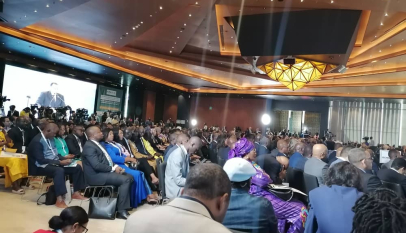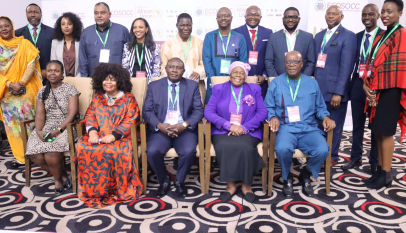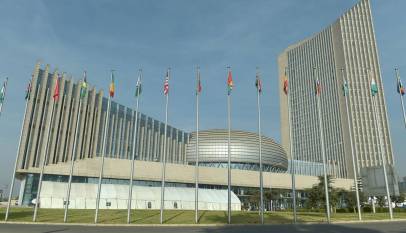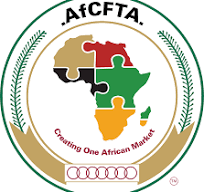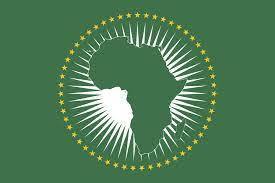AUDA-NEPAD’s Africa Day 2020 convening reechoes African solutions to development challenges
In celebration of Africa Day 2020, the African Union Development Agency (AUDA-NEPAD), Monday hosted a high-level webinar discussion focused on highlighting African solutions to African problems in peace and security, public health and socioeconomic development
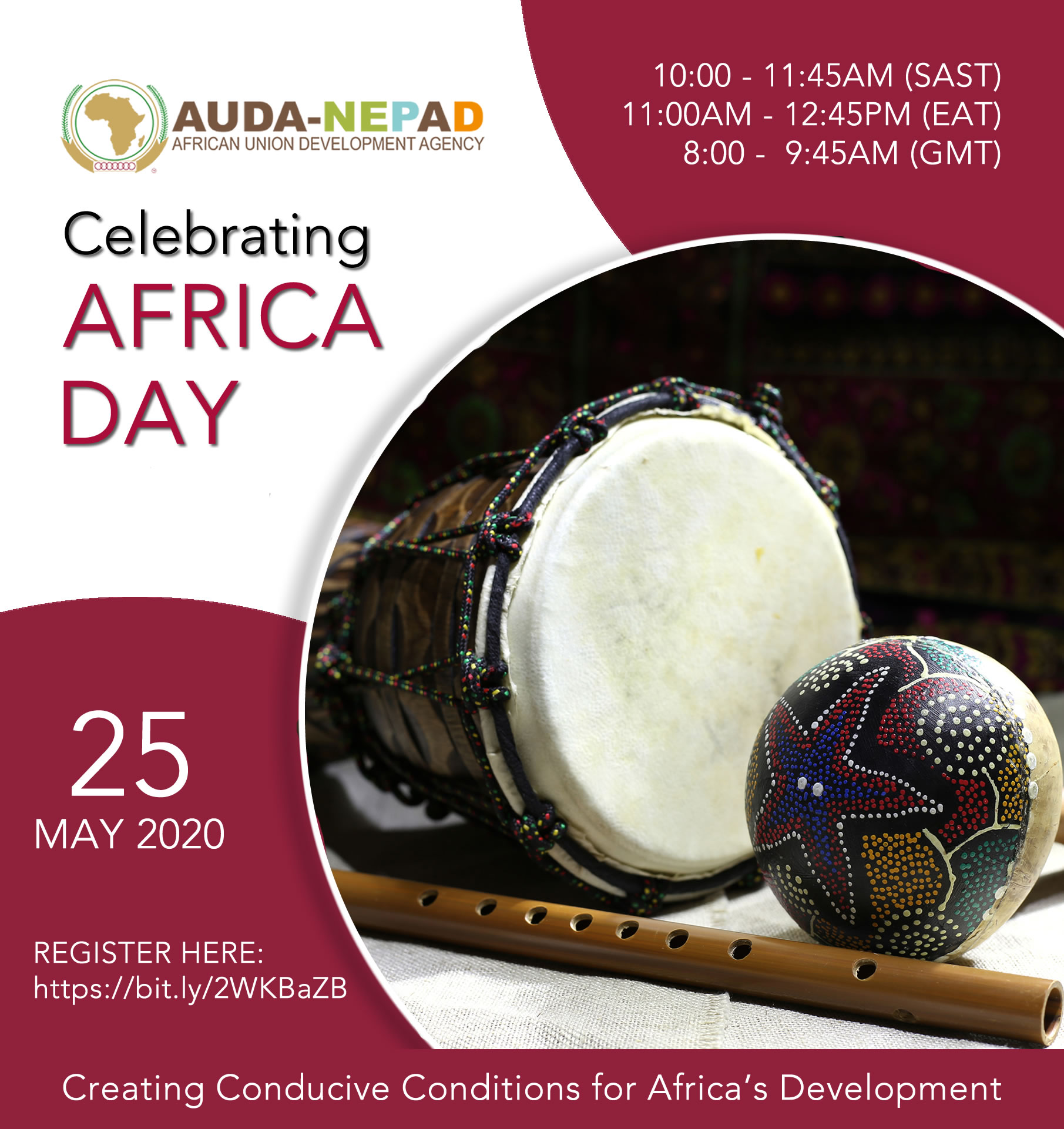
Silencing the Guns in Africa is a flagship programme of Agenda 2063, Africa’s ambitious fifty-year development agenda, which seeks to end all wars, civil conflicts, gender-based violence, prevent genocide as well as all forms violent conflicts in the continent by the year 2020. The vision to silence the guns in Africa by 2020 is in furtherance of Aspiration 4 of Agenda 2063: A peaceful and secure Africa.
Consequently, the African Union Heads of State and Government had selected as the Union’s theme of the year 2020, “Silencing the Guns: Creating Conducive conditions for Africa’s Development.” Even before the outbreak of the COVID-19 pandemic in Africa, it was very much obvious that the goal of silencing the guns in Africa by 2020 was not an achievable one; moreover, the pandemic delayed various planned activities and programmes for the year aimed at ending all violent conflicts and attaining lasting peace in Africa.
Nonetheless, thanks to efforts of the African Union, and separate appeals for a ceasefire by the Chairperson of the African Union Commission Moussa Faki Mahamat and Secretary-General of the United Nations Antonio Guterres, most armed groups in Africa had announced cessation of hostilities as a result of the pandemic. Whereas parties to conflicts in Cameroon, the Central African Republic, Libya, South Sudan and Sudan had declared a truce, the situation in Libya is different as fighting had largely continued, seriously inhibiting efforts to curb the spread of COVID-19.
It was in celebration of Africa Day 2020, and as part of efforts to silence the guns in Africa – a major precondition for accelerating the continent’s socioeconomic development – that the African Union Development Agency (AUDA-NEPAD), Monday hosted a high-level webinar discussion with key stakeholders. The discussion focused on highlighting African solutions to African problems in peace and security, public health and socioeconomic development, by leveraging continental value chains and opportunities, since the global value chains had been disrupted by COVID-19.
The meeting, which had in attendance speakers and participants from around Africa, identified valuable opportunities to be leveraged, during and post COVID-19 pandemic, such as the Africa Continental Free Trade Area (AfCFTA). Hosted by the Chief Executive Officer of AUDA-NEPAD Dr Ibrahim Mayaki, the meeting had as speakers, H.E Wamkele Mene, secretary-general of the AfCFTA Secretariat and Dr Patrick Lumumba, a prominent Pan Africanist and professor of public law from Kenya. Others were the African Union Youth Envoy Aya Chebbi; Ms Yvonne Chaka Chaka, a renowned South African singer and humanitarian as well as Eddy Oketch, a Kenyan youth activist.
In his opening remarks, Dr Mayaki said the COVID-19 pandemic had presented to the African continent “an opportunity it shouldn’t overlook” adding that the continent’s proactive measures in responding to the pandemic such as placing movement restrictions had “protected our people from the levels of mortalities recorded elsewhere due to the pandemic.”
“We have been given but an opportunity to prepare particularly for any [subsequent] pandemics within our borders. It’s time to give the structure of our health systems adequate support to meet the health needs of the continent. So, in this war against the unseen, we need to act as one, we need to unite our effort, we need to have a coordinated plan because no country is in isolation. Africa has no choice but to rely on its own resilience, strength and agility, especially in this times; rather than waiting for external support to mitigate the impact of this crisis and prepare for the next,” he urged.
In his remarks, Mr Mene also agreed that COVID-19 was not only a crisis but also “an opportunity for Africa to do things differently” in the areas of trade and economic development, by relying less on global supply chains, whose weaknesses, he said, had been exposed by the COVID-19 crisis. He added that his focus as chief implementer of the CFTA agreement would be women in trade and youth in trade, urging Africa to rely on African value chains “without necessarily disconnecting ourselves form the global value-chains.”
“I am very confident that we shall overcome this challenges and we shall emerge from this much stronger; and certainly, as the secretary general of the AfCFTA secretariat, I am very committed to this task of finding and implementing strategies to overcome this challenge….To produce [medical equipment and consumables] in Africa we must address critical public health challenges by advancing our industrial development objectives such as drugs manufacturing capacity and intellectual property strategy,” Mene said.
Dr Lumumba decried the fact that despite many initiatives designed to create socioeconomic development and political stability in Africa, such as the Lome Conventions, Cotonou Agreement and Lagos Plan of Action (LPA), the continent had remained an underachiever – one which had consistently unperformed below its potential capacity across all indices of development. He warned that if Africans continued with “our disunited and uncoordinated approach to our problems, we will continue to be susceptible to manipulation by other powers.”
He therefore cautioned African leaders against the activities of foreign powers, as they readied to begin implementation of the CFTA, arguing against the planned postponement of the commencement of trade under the CFTA agreement in July 1 because of COVID-19.
“Indeed the CFTA must be the magic bullet, [but] we must ask ourselves what are the fundamentals that we must look at. Fundamental number one, as the AU has recognized, is we must silence the guns; because if there are conflicts, we cannot achieve economic development. Right now, there are conflicts that continue to occur but are not being reported; we know of the destabilization that continues to occur in northern Mozambique; we know of the activities of Boko Haram [in the Lake Chad region] and the destabilization of Southern Cameroon,” Lumumba said.
He emphasized the importance of innovation in addressing Africa’s development challenges and expressed his displeasure over the failure of discussions at the webinar to dwell on the efforts of the Malagasy Institute of Applied Research (IMRA) in coming up with the herbal coronavirus treatment known as Covid Organics (CVO). Lumumba said although the remedy was still in its developing state, it was “the kind of daring” Africa needed. “This is why I am happy with the Pasteur Institute in Dakar, Senegal who are beginning to produce affordable kits to test for COVID-19.”
Ms Chebbi, in her remarks emphasized the important role of African youths in the CFTA’s implementation saying the agreement needed to deliver for Africa’s young people. She adds that efforts to end violent conflicts in Africa shouldn’t stop at silencing the guns; rather should also include creating conducive conditions for development hence the need for a shift from the youth, peace and security paradigm to a youth, peace and development agenda.
“COVID-19 has forced us to really rethink the notion of security – what is a threat, is it climate change, is it terrorism, COVID-19 or inequality? What does security mean when we impose lockdowns that increase gender-based violence? Can the youth population be protected by police or job security?” she wondered.
Chebbi decried the wide age difference currently existing between African youths and their leaders advocating for bridging the generational leadership gap. “The average age of African leaders is 64 while the average age of African youths is 20; we have at least 40 years of generational gap in leadership which is creating generational tensions. Intergenerational leadership could be an approach to conflict prevention,” she averred.


